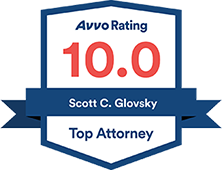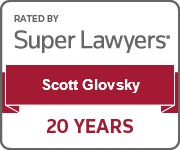
Los Angeles Health Insurance Denial Attorney
Experienced Health Insurance Claim Denial Lawyer Serving Claremont and Pasadena
When you have spent years paying health insurance premiums only to have a claim denied, it can be very discouraging, not to mention potentially damaging to your health. You may need to fight for your rights when it comes to a health insurance denial so you can receive the treatment you need. Most people have no idea where to start or how to proceed when fighting a health insurance denial. Moreover, fighting a big, impersonal insurance company to receive necessary treatment can be a difficult journey that many are simply not up to. When your health is at stake, it is important that you choose an insurance bad faith attorney like Scott Glovsky—a nationally recognized advocate for the rights of the injured and insurance policyholders.
At the Law Offices of Scott Glovsky, we help individuals and businesses get the services, benefits, and compensation their insurance company promised to provide. Whether your claim denial involves health insurance, business insurance, homeowners’ insurance, general liability insurance, auto insurance, long-term care insurance, or any other type of insurance policy, Scott Glovsky can help. Scott knows every tactic practiced by insurance companies, including the most common: delay, deny, underpay. The consequences of these tactics can range from merely inconvenient to catastrophic. For information on fighting health insurance denials, download our eBook, “Everything You Need to Know About Fighting a Health Insurance Denial.”
Page Contents:
- What Are the Legal Duties of an Insurance Company?
- Why Are Claims Often Denied?
- How Do Insurance Companies Manage to Deny, Delay, and Underpay?
- What Rights Do You Have When Your Claim Is Denied?
- What Are Some Common FAQs Regarding Health Insurance Claims Denial?
- What Is the Role of a Lawyer When Your Health Insurance Claim Is Denied?
Scott literally wrote the book on fighting health insurance denials! Schedule a free consultation with our Los Angeles health insurance denial lawyer today by calling (626) 323-8351 or contacting us online.

Our Case Results
Relentlessly Tough, Relentlessly Personal
Scott began representing policyholders instead of insurance companies in 1999 and has consistently sought justice for his clients in ways other firms cannot. Scott is passionate about helping policyholders obtain treatments, coverage, and reimbursement from California insurance companies, including Aetna, Anthem Blue Cross, Blue Shield of California, Health Net, Kaiser Permanente UnitedHealthcare, and other companies providing insurance.
-
$17.3 Million
On April 30, 2019, a 39-year-old father was fatally injured when his Kia Optima collided with a disabled Los Angeles County Metropolitan Authority (LACMTA) bus on the I-10 freeway's express lane.
-
$14.9 Million
Cowart v. Anthem Blue Cross, et al. Anthem sued for misleading California individual plan members about the doctors in its networks for its ACA (“Obamacare”) plans in 2014.
-
$10 Million
General areas addressed: health insurance; treatment and procedure coverage; physician recommendations; critical organ, brain, cancer or spinal cord issues; and out of network coverage issues.
-
$9.29 Million
Arce v. Kaiser. Kaiser Permanente sued for denying ABA and speech therapy to children with Autism Spectrum Disorders.
-
$8.5 Million
General areas addressed: health insurance; treatment and procedure coverage; physician recommendations; critical organ, brain, cancer or spinal cord issues; and outside of network coverage issues.

What Are the Legal Duties of an Insurance Company?
Your insurance company has certain basic responsibilities owed to you, the insured. If these responsibilities are not upheld, the insurance company could face liability for the resulting damages. The duties of insurance companies include:
Duty to Defend
When a third party brings a claim, the insurance company has a duty to defend its policyholder, hiring an attorney at its own expense to properly represent the policyholder by providing a meaningful defense. This is a broad duty, extending to all claims potentially covered under the policy, based on any facts alleged or otherwise disclosed in the claim. The courts have held that a meaningful defense includes all claims and does not allow an insurance company to parse claims.
Duty to Indemnify
When written and specified in contracts, indemnity can be confusing. In its simplest form, indemnity refers to the obligation of one party to pay for losses incurred by another party. As an example, as a policyholder, if you are found liable to a third party for damages, your insurance company must pay the damages up to the policy limits. This payment is called indemnity.
Duty of Good Faith and Fair Dealing
The relationship between an insurance company and a policyholder creates a duty of “good faith and fair dealing,” with the courts often referring to what a policyholder is really buying as “peace of mind.” The insurance company must do what is right to protect the policyholder—if they do not, they could be acting in bad faith. This bad faith can trigger severe penalties for an insurance company, including the possibility of punitive punishment.
Duty to Fairly and Quickly Manage Claims
Insurance companies have a duty to fairly and promptly investigate any first-party and third-party claim, to provide the benefits of the policy, and to pay any valid claim. These duties must be carried out with reasonable speed under the insurance company’s duty of “good faith and fair dealing.”
Duty to Settle Within Insurance Policy Limits
Recent California law indicates insurers must make a good faith effort to settle a claim within its own policy limits, regardless of whether or not the other party demands a settlement. Failure to do so can indicate bad faith on the part of the insurance company.
Duty to Disclose Conflicts
Insurance companies have a duty to disclose any conflicts that occur during the case to the insured. The defending attorney has a duty to equally weigh the interests of both the policyholder and the insurance company, and when a conflict arises, the defense attorney must disclose to both. In some cases, a separate attorney for the insured (paid for by the insurance company) could be required. This is known as Cumis counsel.
An example of a conflict that would trigger Cumis counsel is when the defense lawyer uses policy limits as the upside risk to the insurance company while risking harm to the policyholder by doing so. Obviously, the insured wants the defense attorney to aggressively settle the claim within the limits of the policy since any amount over the limit would be the insured’s responsibility. The conflict arises if the defense attorney knows there is a good chance of losing the case yet attempts to minimize the settlement by threatening trial.
Another common conflict occurs when an insurer believes certain claims are not a part of the policyholder’s coverage, issuing a “reservation of rights” letter which states the insurance company is reserving the right to later deny the claim, should any facts surface that prevent coverage. Such conflicts could result in the defense developing a strategy that harms the insured, based on how the claims in the case are addressed and defended. In the state of California, when an insurance company issues a “reservation of rights” letter, it may be acknowledging a conflict that allows the insured to hire a separate attorney.
Any time a conflict prevents the insured from receiving a proper defense, the insurance company must hire and pay for a separate lawyer to defend the policyholder. The Cumis counsel—the attorney representing a defendant in a lawsuit where there is an insurance policy covering the claim, but there is a conflict of interest between the insured and the insurance company—can lead to a better defense for the insured. Attorney Scott Glovsky has litigated many cases where Cumis counsel should have been appointed but was not. In this type of situation, the insurance company must pay damages caused by the failure to provide Cumis counsel.
In short, insurance companies have the following obligations to their policyholders:
- Insurance companies must treat the interests of those they insure with the same consideration given to their own interests.
- Insurance companies must help policyholders with claims, explaining coverage and available benefits to those they insure.
- Each claim must be promptly and fairly investigated by the insurance company.
- When payment is owed, the insurance company must promptly pay the claim.
- If a claim is denied, an explanation must be given to the insured by the insurance company.
- All significant facts associated with the claim must be disclosed to policyholders.
Why Are Claims Often Denied?
When an insurance company refuses to pay a health care claim, it is known as a denial. Some of the most common reasons (according to healthcare insurance companies) your healthcare claim could be denied include:
- Often, claim denial is the result of a mix-up or paperwork error. As an example, your name could be listed differently between your doctor’s office and your insurer, such as Jane Q. Doe vs. Jane O. Doe.
- The insurance company does not believe the requested service is medically necessary, even if you need the service. Your healthcare provider must then provide more information regarding why you require the medical service.
- The insurance company wants you to try a different (translate: less expensive) option first. In some cases, if you do try the less expensive option first and it doesn’t work, then the insurance company will pay for the requested service. Prescription drug step therapy is a common example of this. Statin drugs are very expensive, some even more than others. Your doctor might prescribe a statin that is at the high end of the spectrum. The insurance company may require you to try less expensive alternatives, then if your doctor states those alternatives did not work, the original prescription could be covered.
- The health service you are requesting isn’t covered by your healthcare plan. As an example, many healthcare insurance policies do not cover cosmetic surgery, some policies will cover chiropractic care while others will not, and some policies will cover mental health expenses, while others will not.
- Your medical services were not administered by an in-network healthcare provider. Managed care systems tend to be very structured, allowing you to seek treatment only by doctors and facilities that are part of your plan’s provider network. If you are seeking prior authorization for a medical treatment from an out-of-network provider, you might be approved for the treatment from an in-network healthcare provider.
- There are details missing from your claim or pre-authorization request. Your healthcare provider may not have provided sufficient detail regarding why you need the treatment or procedure.
- The rules of your health plan were not properly followed. As an example, say you are required to obtain pre-authorization for a specific non-emergency test, yet you have the test done without getting pre-authorization. The insurer may then deny payment for that test, even if you really needed it, simply because you failed to follow the rules.
You may wonder how often claims are denied. In 2020, about 18% of in network claims were denied (claims and appeals for non-group qualified health plans offered on the healthcare.gov exchange) according to the Centers for Medicare and Medicaid Services (CMS). This 18% is an average. Individual insurance company denial rates varied from under 1% to over 80%. And less than 1% of people appeal these decisions.
How Do Insurance Companies Manage to Deny, Delay, and Underpay?
Health insurance companies routinely find “loopholes’ in their policies as a method of minimizing payouts. You may wonder just how insurance companies manage to get away with the deny, delay, underpay tactics, and how those tactics are implemented.
Deny
Insurance companies may deny claims for a variety of reasons, perhaps by claiming the premiums were paid late, or that a policy excludes certain coverage. Regarding healthcare denials, the following are the most common reasons for denials:
- The medical treatment or procedure is not covered, is not medically necessary, was not pre-authorized, or is experimental.
- The procedure denied is merely cosmetic.
- The medical provider was out-of-network, or out-of-plan.
- The policyholder misrepresented something in their original application.
Attorney Scott Glovsky has often achieved reversals of denials for any of the above reasons.

Meet Our Team
If Results Matter, Then Hire Us

How Our Firm’s Cases Have Changed Lives
Read What Clients Say About Us
-
"Scott believes in his clients."
He cares about every one of them. I'm a lawyer in another state. I routinely refer folks who have insurance issues to Scott. He's the expert and he cares.
- Chuck B. -
"Nice guy, good listener."
He had some good advice about appealing a denial of coverage from Kaiser Permanente, and my options if the appeal is denied. Thanks, Scott!
- Paul A. -
"If we need a lawyer I know exactly who I will contact."
Scott listened carefully to our complex case and asked surgically precise and cogent questions. His advice was immediately relevant and gave us the phrases necessary to attach to our medical insurance appeals nightmare.
- Robert B. -
"I highly recommend attorney Scott Glovsky."
In addition to Mr. Glovsky's undeniable legal expertise, he is a genuinely nice person, extremely pleasant and easy to talk to. He is a good listener and quickly grasped the situation and gave me terrific helpful advice.
- Carole K.

Our Resources
-
 Book
BookScott Glovsky's book "Fighting Health Insurance Denials" serves as a resource for attorneys fighting health insurance denial cases. Learn more about the book and how to buy below.
-
 PodcastIn Scott Glovsky's podcast, Trial Lawyer Talk, Scott interviews and speaks with some of the country's top trial attorneys.
PodcastIn Scott Glovsky's podcast, Trial Lawyer Talk, Scott interviews and speaks with some of the country's top trial attorneys. -
 ScholarshipOur Power of Resilience Scholarship competition awards one student that expresses how they used resilience to recover from a personal trauma with a $1,000 scholarship.
ScholarshipOur Power of Resilience Scholarship competition awards one student that expresses how they used resilience to recover from a personal trauma with a $1,000 scholarship.




















